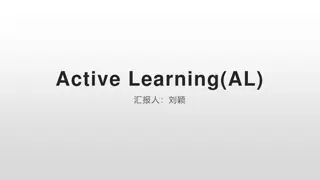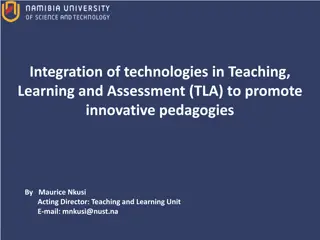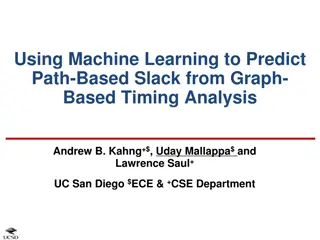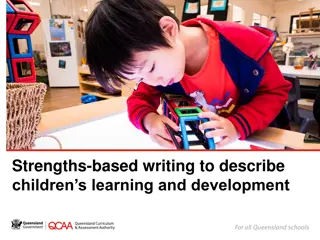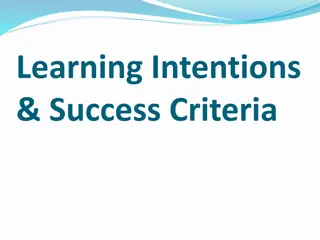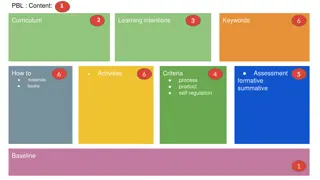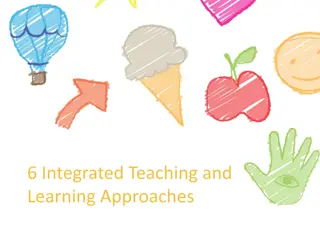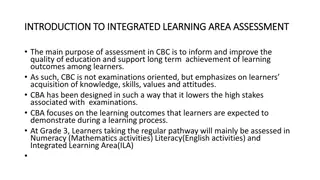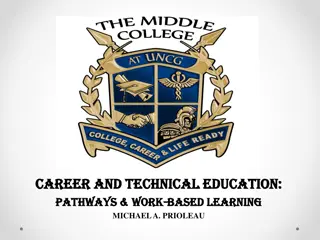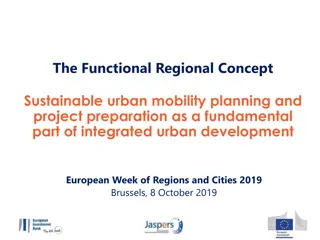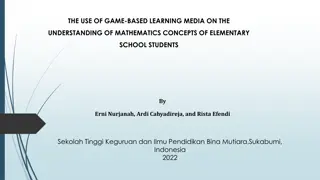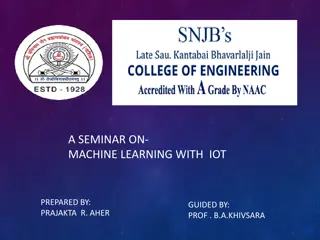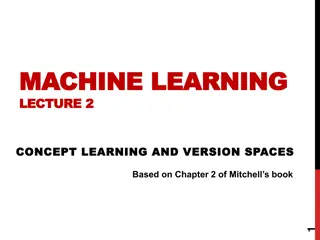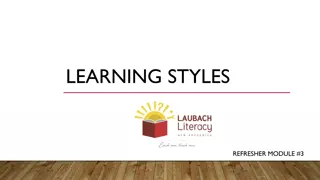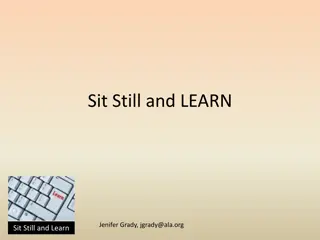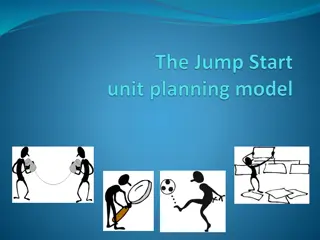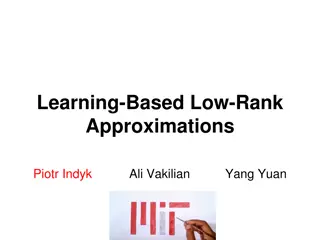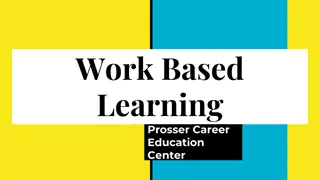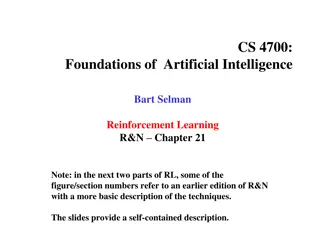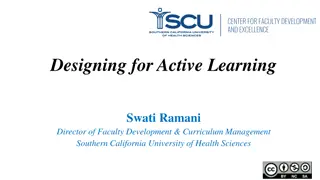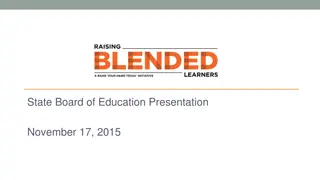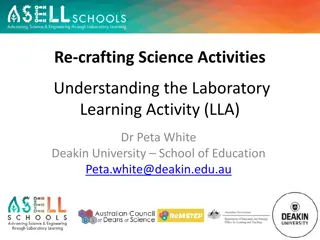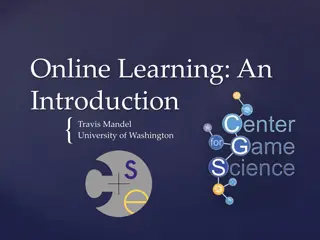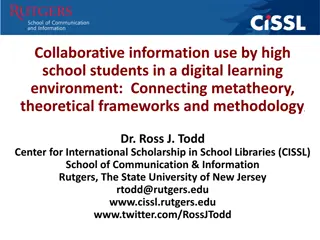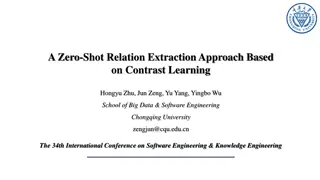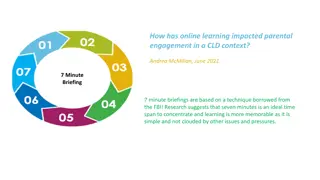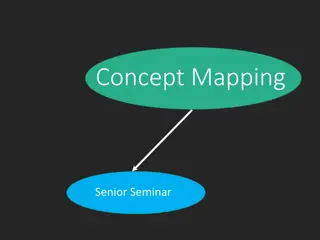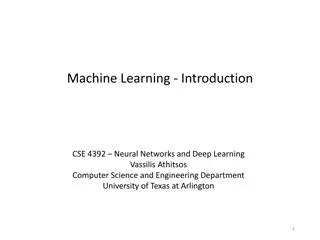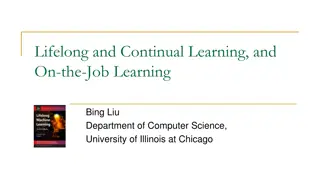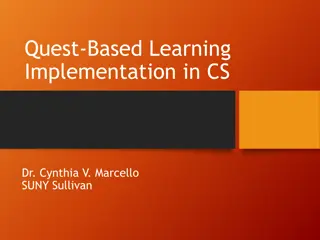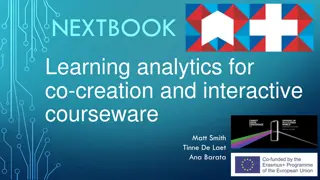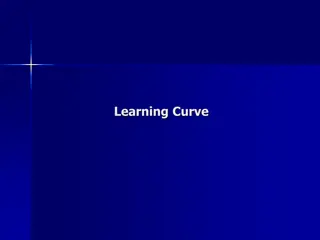Exploring Small Group Teaching and Flipped Classrooms
This insightful presentation delves into the framework, advantages, ways to incorporate, and pros and cons of small group teaching and flipped classrooms. It covers topics such as active learner engagement, creating safe learning environments, and the benefits of a flipped classroom approach. The co
1 views • 18 slides
Understanding the Concept of Return to Factor in Production Economics
Return to Factor is a key concept in production economics that explains the relationship between variable inputs like labor and total production output. The concept is based on the three stages of production - increasing returns, diminishing returns, and negative returns. By analyzing the behavior o
0 views • 7 slides
Understanding Active Learning in Machine Learning
Active Learning (AL) is a subset of machine learning where a learning algorithm interacts with a user to label data for desired outputs. It aims to minimize the labeling bottleneck by achieving high accuracy with minimal labeled instances, thus reducing the cost of obtaining labeled data. Techniques
0 views • 17 slides
Integration of Technologies in Teaching, Learning, and Assessment for Innovative Pedagogies
Explore the importance of integrating technologies in teaching, learning, and assessment to foster innovative pedagogies. Learn about the definition of learning, how technology facilitates learning, and available technologies at NUST. Understand the concept of learning as a change in behavior due to
0 views • 21 slides
Machine Learning for Predicting Path-Based Slack in Timing Analysis
Utilizing machine learning to forecast path-based slack in graph-based timing analysis offers a solution for optimizing power and area efficiency in the design process. The Static Timing Analysis incorporates accurate path-based analysis (PBA) and fast graph-based analysis (GBA) to estimate transiti
1 views • 31 slides
Understanding Strengths-Based Writing for Children's Learning and Development
Strengths-based writing focuses on identifying and emphasizing children's strengths and abilities to support their learning and development. This approach is inclusive, helping teachers discover strategies tailored to each child's unique strengths for enhanced success in learning. Principles and res
0 views • 21 slides
Understanding Learning Intentions and Success Criteria
Learning intentions and success criteria play a crucial role in enhancing student focus, motivation, and responsibility for their learning. Research indicates that students benefit greatly from having clear learning objectives and criteria for success. Effective learning intentions should identify w
1 views • 24 slides
Designing Effective Project-Based Learning Units
Explore the process of creating engaging project-based learning units by delving into themes, curriculum alignment, learning intentions, criteria assessment, and activities. Understand how to connect content with student knowledge, develop learning goals, establish assessment criteria, and plan form
1 views • 8 slides
Integrated Teaching and Learning Approaches for Children: A Comprehensive Overview
Explore integrated teaching and learning approaches that combine guided play, adult-led learning, and child-directed play to create effective learning environments. Understand the importance of play in children's development, the role of adults in facilitating play, and the concept of guided play an
1 views • 30 slides
Experiential Learning Portfolio Program at Barry University
Experiential Learning Portfolio Program at Barry University's School of Professional and Career Education (PACE) offers a unique opportunity to earn college credit for learning gained from work and community service experiences. Through this program, students can showcase their experiential learning
0 views • 16 slides
Comprehensive Overview of Integrated Learning Area Assessment in CBC Curriculum
The assessment in Competency-Based Curriculum (CBC) focuses on improving education quality and supporting long-term learning outcomes. At Grade 3, learners are mainly assessed in Numeracy, Literacy, and Integrated Learning Area (ILA). ILA assessment is project-based, integrating knowledge and skills
0 views • 5 slides
Exploring Work-Based Learning in Career and Technical Education
Work-based learning provides students with valuable real-world experiences, bridging the gap between classroom knowledge and practical skills. It offers benefits to students, schools, and employers, enhancing academic performance, student motivation, and workforce readiness. Various types, such as a
0 views • 8 slides
Functional Regional Concept for Sustainable Urban Mobility Planning
The Functional Regional Concept emphasizes sustainable urban mobility planning as an integral part of integrated urban development. This concept aims to support economic and social growth by adjusting the transport system to various activities within a city. It focuses on sector/system sustainabilit
0 views • 20 slides
Enhancing Mathematics Understanding in Elementary Students Through Game-Based Learning Media
Lack of understanding in Mathematics concepts among elementary school students is a common issue. This study explores the use of game-based learning media to improve students' comprehension. By integrating web-based games, students can engage in interactive learning activities that enhance their und
0 views • 9 slides
Seminar on Machine Learning with IoT Explained
Explore the intersection of Machine Learning and Internet of Things (IoT) in this informative seminar. Discover the principles, advantages, and applications of Machine Learning algorithms in the context of IoT technology. Learn about the evolution of Machine Learning, the concept of Internet of Thin
0 views • 21 slides
Innovative Learning Management System - LAMS at Belgrade Metropolitan University
Belgrade Metropolitan University (BMU) utilizes the Learning Activity Management System (LAMS) to enhance the learning process by integrating learning objects with various activities. This system allows for complex learning processes, mixing learning objects with LAMS activities effectively. The pro
4 views • 16 slides
Understanding Concept Learning and Version Spaces in Machine Learning
In the field of machine learning, concept learning involves inferring general definitions of concepts from labeled examples. This process aims to approximate the best concept description from a set of possible hypotheses. The concept learning approach is illustrated through examples, such as predict
0 views • 18 slides
Understanding Learning Styles and Criticisms: A Comprehensive Overview
Delve into the concept of learning styles, explore different approaches, and learn how to incorporate visual, auditory, and kinesthetic learning in lesson planning. Uncover the controversies surrounding learning styles, criticisms against fixed style theories, and insightful discussions on matching
1 views • 26 slides
Comparison of GUI-Based and Text-Based Assignments in CS1
This study investigates the effectiveness of GUI-based assignments compared to text-based assignments in a CS1 course. The research explores how student motivation impacts their performance and retention in the course. It also delves into student preferences between GUI-based and text-based assignme
0 views • 19 slides
Exploring Transliteracy and Pedagogical Models in Digital Learning Environments
This content delves into the concepts of transliteracy and pedagogical models, emphasizing the importance of mapping meaning across various media in digital learning. It discusses the interconnectedness of text literacy, visual literacy, and digital literacy, highlighting the social uses of technolo
0 views • 15 slides
Unlocking the Power of Online Learning with Jenifer Grady
Explore the transformative nature of learning through online platforms with insights from Jenifer Grady. Understand the essence of learning, reasons behind learning, accessibility, and the concept of online learning. Discover how learning can be achieved anywhere, anytime, and delve into the world o
0 views • 26 slides
Enhancing Learning Through Active Strategies and Learning Styles
Implement active learning strategies to engage students, deliver and review content, and foster collaboration. Explore Kolb's Learning Styles to accommodate diverse learner preferences and maximize learning outcomes. Integrating learning activities based on individual styles can create a more effect
0 views • 22 slides
Learning-Based Low-Rank Approximations and Linear Sketches
Exploring learning-based low-rank approximations and linear sketches in matrices, including techniques like dimensionality reduction, regression, and streaming algorithms. Discusses the use of random matrices, sparse matrices, and the concept of low-rank approximation through singular value decompos
0 views • 13 slides
Work-Based Learning at Prosser Career Education Center
Prosser Career Education Center in Indiana emphasizes work-based learning experiences for all students to enhance their career pathways. Through job shadowing programs, students gain valuable insights into various career possibilities by observing professionals in their fields of interest. These str
26 views • 19 slides
Introduction to Reinforcement Learning in Artificial Intelligence
Reinforcement learning offers a different approach to problem-solving by learning the right moves in various states rather than through exhaustive searching. This concept, dating back to the 1960s, involves mimicking successful behaviors observed in agents, humans, or programs. The basic implementat
0 views • 15 slides
Enhancing Learning Through Active Engagement: Strategies and Insights
Explore the concept of active learning with Swati Ramani, Director of Faculty Development & Curriculum Management at the Southern California University of Health Sciences. Discover the practical applications of active learning, key learning outcomes, and strategies for effective implementation. Dive
1 views • 19 slides
Blended Learning Initiatives in Education: RYHT Presentation Overview
Blended learning, as defined in the State Board of Education presentation on November 17, 2015, is gaining traction in K-12 education for achieving student-centered learning at scale. The presentation highlights the potential benefits of blended learning in enhancing student achievement through pers
0 views • 10 slides
Enhancing Science Education Through Laboratory Learning Activities
Explore the importance of laboratory learning activities (LLAs) in science education, focusing on contemporary science representation, inquiry skills, and conceptual learning. Discover the benefits of inquiry-based learning, teaching science inquiry skills, and incorporating more inquiry-based learn
0 views • 22 slides
Computational Learning Theory: An Overview
Computational Learning Theory explores inductive learning algorithms that generate hypotheses from training sets, emphasizing the uncertainty of generalization. The theory introduces probabilities to measure correctness and certainty, addressing challenges in learning hidden concepts. Through exampl
0 views • 43 slides
Understanding Online Learning in Machine Learning
Explore the world of online learning in machine learning through topics like supervised learning, unsupervised learning, and more. Dive into concepts such as active learning, reinforcement learning, and the challenges of changing data distributions over time.
0 views • 49 slides
Enhancing High School Students' Collaborative Information Use
This research project delves into the collaborative information use by high school students in digital learning environments. It explores team-based inquiry, project-based learning, collaborative learning, and cooperative learning. The study aims to track the process of team work, understand the dyn
0 views • 22 slides
Zero-Shot Relation Extraction Based on Contrast Learning
This paper presents a zero-shot relation extraction approach based on contrast learning, aiming to improve the efficiency of relation extraction tasks. The methodology involves utilizing a knowledge graph to extract relational triplets and leveraging zero-shot learning to automate the process. The s
0 views • 21 slides
Sure, based on the content provided, here are the requested items: "Transforming Education for Joyful Learning: Dr. Vijay Patel's Vision
Dr. Vijay Patel, from GCERT Gandhinagar, emphasizes shifting learning from rote methods to integrating examination into classroom learning and connecting knowledge with real-life experiences. He advocates for joyful learning without burden, promoting activity-based learning and subject inter-relatio
0 views • 12 slides
Impact of Online Learning on Parental Engagement in CLD Context
The global pandemic in 2020 led to the closure of schools, shifting learning to online platforms. This study explores how online learning has affected parental engagement in Culturally and Linguistically Diverse (CLD) contexts. Family Learning, distinct from homeschooling, plays a crucial role in en
0 views • 11 slides
Mastering Concept Mapping for Senior Seminar Success
Explore the power of concept mapping in senior seminars, understand what concept maps are, why they are valuable, and how to create and utilize them effectively for organizing ideas, brainstorming, and enhancing collaboration. Dive into practical tips and tools to create meaningful concept maps for
0 views • 13 slides
Understanding Machine Learning: Types and Examples
Machine learning, as defined by Tom M. Mitchell, involves computers learning and improving from experience with respect to specific tasks and performance measures. There are various types of machine learning, including supervised learning, unsupervised learning, and reinforcement learning. Supervise
0 views • 40 slides
Lifelong and Continual Learning in Machine Learning
Classic machine learning has limitations such as isolated single-task learning and closed-world assumptions. Lifelong machine learning aims to overcome these limitations by enabling models to continuously learn and adapt to new data. This is crucial for dynamic environments like chatbots and self-dr
0 views • 32 slides
Implementing Quest-Based Learning in Computer Science Education
Quest-Based Learning (QBL) is an instructional design theory leveraging game mechanics to enhance student choice and engagement in CS courses. Utilizing missions, systems thinking, play design, intelligent resourcing, attribution of meaning, and experimentation mindset, QBL fosters problem-solving,
0 views • 25 slides
Enhancing Learning Through Co-Created Interactive Courseware and Learning Analytics
Explore the innovative concept of co-creation in interactive courseware and learning analytics to improve student learning outcomes. Discover how students collaborate in a social learning environment, track their progress, and engage in dialogic and constructive pedagogical strategies. Harness the p
0 views • 19 slides
Understanding the Learning Curve Phenomenon in Manufacturing
Performance improvement in manufacturing is described by the learning curve, where labor input per unit decreases as experience grows. The general equation and exponential curve of learning are discussed, along with the concept of learning rate. Determining the index of learning from the learning ra
0 views • 11 slides


